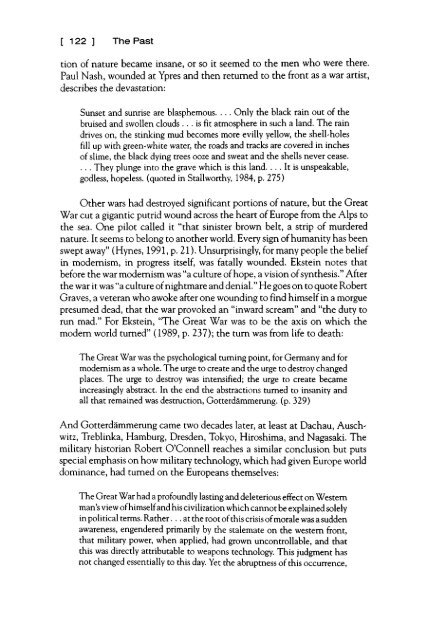entire book - Chris Hables Gray
entire book - Chris Hables Gray
entire book - Chris Hables Gray
You also want an ePaper? Increase the reach of your titles
YUMPU automatically turns print PDFs into web optimized ePapers that Google loves.
[ 122 ] The Past<br />
tion of nature became insane, or so it seemed to the men who were there.<br />
Paul Nash, wounded at Ypres and then returned to the front as a war artist,<br />
describes the devastation:<br />
Sunset and sunrise are blasphemous. . . . Only the black rain out of the<br />
bruised and swollen clouds... is fit atmosphere in such a land. The rain<br />
drives on, the stinking mud becomes more evilly yellow, the shell-holes<br />
fill up with green-white water, the roads and tracks are covered in inches<br />
of slime, the black dying trees ooze and sweat and the shells never cease.<br />
. . . They plunge into the grave which is this land. ... It is unspeakable,<br />
godless, hopeless, (quoted in Stallworthy, 1984, p. 275)<br />
Other wars had destroyed significant portions of nature, but the Great<br />
War cut a gigantic putrid wound across the heart of Europe from the Alps to<br />
the sea. One pilot called it "that sinister brown belt, a strip of murdered<br />
nature. It seems to belong to another world. Every sign of humanity has been<br />
swept away" (Hynes, 1991, p. 21). Unsurprisingly, for many people the belief<br />
in modernism, in progress itself, was fatally wounded. Ekstein notes that<br />
before the war modernism was "a culture of hope, a vision of synthesis." After<br />
the war it was "a culture of nightmare and denial." He goes on to quote Robert<br />
Graves, a veteran who awoke after one wounding to find himself in a morgue<br />
presumed dead, that the war provoked an "inward scream" and "the duty to<br />
run mad." For Ekstein, "The Great War was to be the axis on which the<br />
modern world turned" (1989, p. 237); the turn was from life to death:<br />
The Great War was the psychological turning point, for Germany and for<br />
modernism as a whole. The urge to create and the urge to destroy changed<br />
places. The urge to destroy was intensified; the urge to create became<br />
increasingly abstract. In the end the abstractions turned to insanity and<br />
all that remained was destruction, Gotterdammerung. (p. 329)<br />
And Gotterdammerung came two decades later, at least at Dachau, Auschwitz,<br />
Treblinka, Hamburg, Dresden, Tokyo, Hiroshima, and Nagasaki. The<br />
military historian Robert O'Connell reaches a similar conclusion but puts<br />
special emphasis on how military technology, which had given Europe world<br />
dominance, had turned on the Europeans themselves:<br />
The Great War had a profoundly lasting and deleterious effect on Western<br />
man's view of himself and his civilization which cannot be explained solely<br />
in political terms. Rather... at the root of this crisis of morale was a sudden<br />
awareness, engendered primarily by the stalemate on the western front,<br />
that military power, when applied, had grown uncontrollable, and that<br />
this was directly attributable to weapons technology. This judgment has<br />
not changed essentially to this day. Yet the abruptness of this occurrence,








